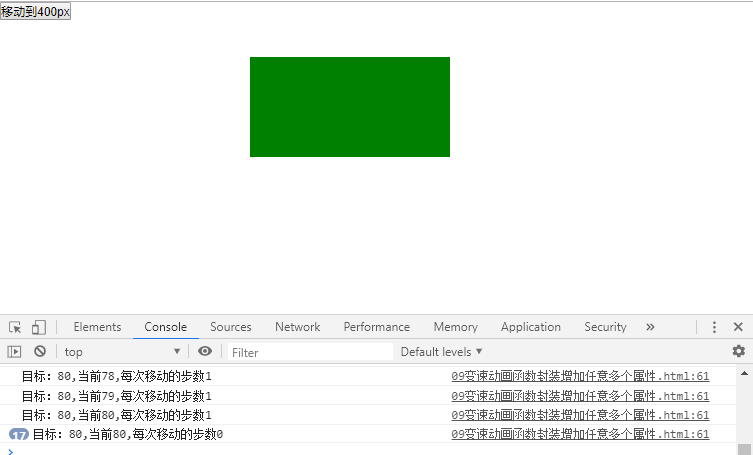Encapsulate slow motion animation function - add multiple arbitrary attributes
On the basis of adding any attribute to the original slow motion animation function, the following changes have been made
1. The original function animate(element, attr, target), three variables, is replaced by json object to install a pair: attribute: the value of the target location, changed to function animate(element, json)
2. The previous variable speed animation function, any attribute, changes its current attribute position to reach the target attribute. Now there are multiple arbitrary attributes loaded with json objects, so it is necessary to traverse every value for (VaR key in json) {}. Key is the attr here, so the traversal for(var attr in json)
3. The target value corresponding to the current attribute, var target is the target of the value in json, var target=json[attr];
4. flag judgment is added to ensure that all the values in json reach the destination, and then clear the timer
<!DOCTYPE html> <html lang="en"> <head> <meta charset="UTF-8"> <title>title</title> <style> * { margin: 0; padding: 0; } div { margin-top: 30px; width: 200px; height: 100px; background-color: green; position: absolute; left: 0; top: 0; } </style> </head> <body> <input type="button" value="Move to 400 px" id="btn1" /> <div id="dv"> </div> <script src="common.js"></script> <script> //Click the button to change the width to reach a target value //Click the button to change the width to reach a target value and the height to reach a target value //Get the current value of any attribute of any element function getStyle(element, attr) { return window.getComputedStyle ? window.getComputedStyle(element, null)[attr] : element.currentSytle[attr] || 0; } function animate(element, json) { clearInterval(element.timeId); element.timeId = setInterval(function () { var flag = true; //Default, assume, all reach target for (var attr in json) { //Gets the current value of this attribute of the element var current = parseInt(getStyle(element, attr)); //Target value corresponding to the current attribute var target = json[attr]; //Steps moved var step = (target - current) / 10; step = step > 0 ? Math.ceil(step) : Math.floor(step); current += step;//Value after move element.style[attr] = current + "px"; if (current != target) { flag = false; } } if (flag) { clearInterval(element.timeId); } //Test code console.log("Objectives:" + target + ",current" + current + ",Steps per move" + step); }, 20) } my$("btn1").onclick = function () { animate(my$("dv"), { "width": 400, "height": 200, "left": 500, "top": 80 }) }; </script> </body> </html>
The effect is as follows:
